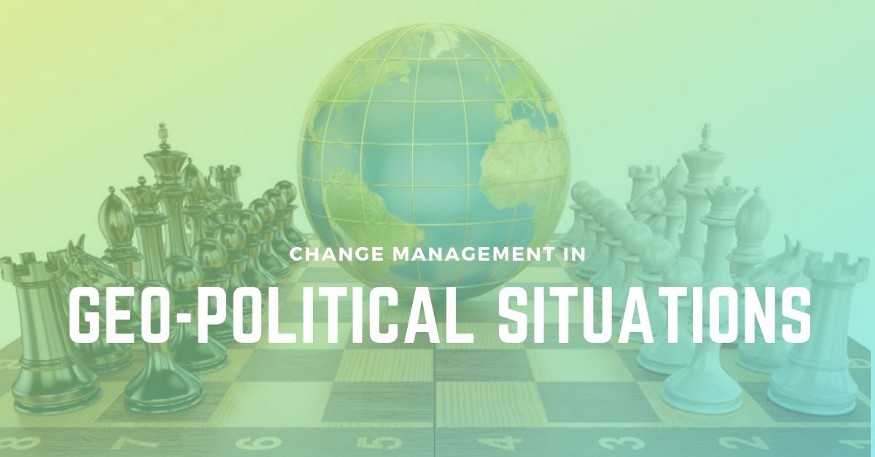Change Management In Geopolitical Situations

Earlier, I spoke about how communication aids in change management. Now, we will look at managing change in the geopolitical situation and what leaders can do to adapt to it.
The moment a business starts operating outside of its home regions, it needs to adapt to regions origins and understand the context to make good choices and minimize potentially damaging consequences. Current world politics and economics are creating opportunities for companies and leaders who can look out and take in the global picture.
Changing Times
Political risk and volatility have always existed but the recent few years have been distinguished by a lack of clarity in global leadership. Political changes used to be predictable and transparent but threats have now become harder to classify.
Recent turbulent years have seen emerging markets like China and India swaying the global balance of power. Moreover, unexpected election results in North America and Europe have set about unexpected political decisions and changes. The question then arises — How do you, as an organization leader, understand these risks and plan for them?
Climate of Uncertainty
Uncertainty surrounds interaction between countries, predicting scenarios and threats that might arise. Complicating matters, each of these factors can directly influence trade policy and protectionism. The past five years have seen political risk levels increase all around the world. Geographically, more conventionally troubled regions like the Middle East are experiencing evolving tensions, impacting companies as conflict rises. However, it has been the political risk in Europe and the United States that have proven surprising.
US policy is changing to include several populist or protectionist agendas, battling disruptions from China and the stability of regimes in Russia, North Korea and Saudi Arabia. Possible trade wars loom as politically motivated regulatory changes affect the sales of goods, tax rates and exchange transfer risks. As countries are forced to choose sides, companies are forced to plan strategically and choose as well.
Keep Ahead
There are some easy approaches to prepare you for change. Be aware of your surroundings, stay connected, and notice trends. Dangers could range from economic to security-related risks and the company should be prepared to handle them. Current geopolitical situations can often leave you lost in the fog, so here are ways to keep yourself one step ahead of your competition, as a company or individual.
Handling Pressure & Risk
When operating on a large scale, a company should not have a single strategy for every one of the different regions. Mounting pressure from stakeholders such as investors and board members has led to CEOs and CFOs being receptive to determining whether global operations will be successful in certain regions. Many companies are already taking steps to mitigate political risk, with management being held accountable for any losses experienced through political risk exposure. The company should keep the geopolitical situation of the country in mind before making a strategic decision. That way, the strategy is congruent with the location and has greater longevity.
Technological & Financial
Technology and geopolitical risk are becoming even more closely related. It is up to companies to make use of technology to mitigate themselves from the risks of cyberwar or terrorism. Companies can use data to make decisions and technology-enabled tools and systems to develop mitigation strategies. Another technique is by employing financial strategies to manage political risk and reduce exposure when operating in risky locations, whether it. For example, if a country is under embargo, you can either decrease prices or find a new market.
Managing Risk
Companies will need to manage risk, especially when dealing with countries that pose an inherent risk. Taking a more active role is preferable when adjusting to a changing risk environment. Companies can make adjustments to their political risk management approaches and technological capabilities. Steps need to be taken to create new processes and reporting that enable them to manage organisational resources and intelligence sharing better. A risk management team with ties to the government or external affairs is also useful.
Cultural Integration
The company will need to leverage human resources to understand the local culture, partners and adapt business and sales to that region. Having an efficient, customised strategy is very important for the long-term survival and goodwill of the company in that region.
Political risk is sometimes considered a cost of doing business without properly inspecting or quantifying it. A process-driven approach is needed to take into consideration the political, economic, social and environmental issues for a more coordinated company-wide strategy. Geopolitical risk analysis should be incorporated into operational decision-making with planning for different contingencies and scenarios.
Conclusion
As the US loses its dominance over the world, the nature of risk is changing. Rising volatility and geopolitical risk levels require companies to respond proactively to change, by building new capabilities, adopting mitigation techniques, and setting up processes, which will be the ones to last. Today, It is not so much about your skills, business practices, or line of work. It is about how adept you are at handling a change that will define your altitude.
Follow Our Founder Ashok Tamhankar In Medium





